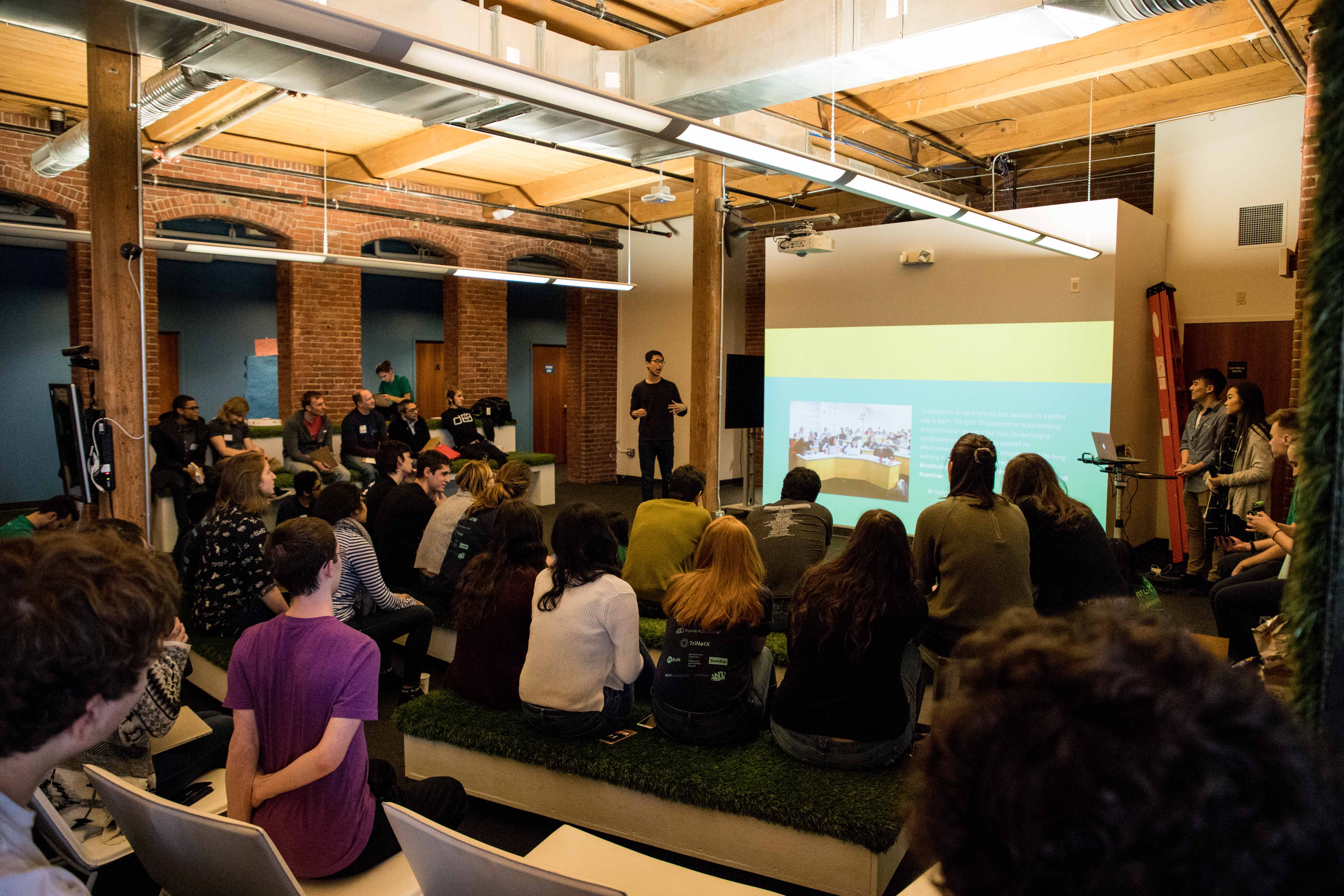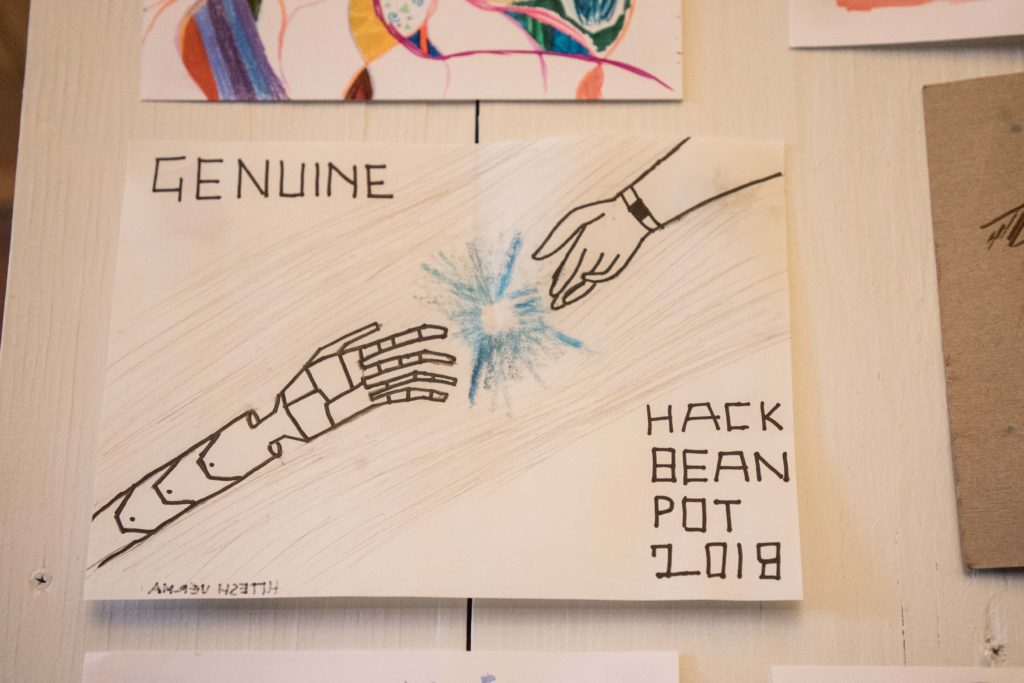By Bradley Fargo, news correspondent
Tal Usvyatsky and Da-Jin Chu are both first-year computer science majors at Northeastern. They also both like dogs.
Last weekend, they worked together to make an app called Dog Detective. Anyone can see dogs in their area, and anyone can add dogs to the map. It’s Waze, but for dogs.
“Obviously dogs are very important. It’simportant to know where they are at all times,” Chu said. “Basically, it just helps you pet all the dogs.”
People can even “superlike” a dog if they’re really feeling it.
The pair created the app Friday through Sunday at HackBeanpot, a free hackathon event held annually in Boston during Beanpot weekend. At a hackathon, teams of like-minded people work to create things, usually coding or computer engineering projects that could be described as “tech.”
“It’s not a weekend to break into banks and steal their data. Many people have that impression,” said Suzanne Becker, co-president of HackBeanpot and a third-year computer science major. “The ‘hack’ is in reference to the building of projects in a perhaps haphazard manner that also works in the end.”
Usvyatsky and Chu plan to publish Dog Detective on the Android store in a couple of weeks. It already won the “Least Likely To Make Money” award at the event.
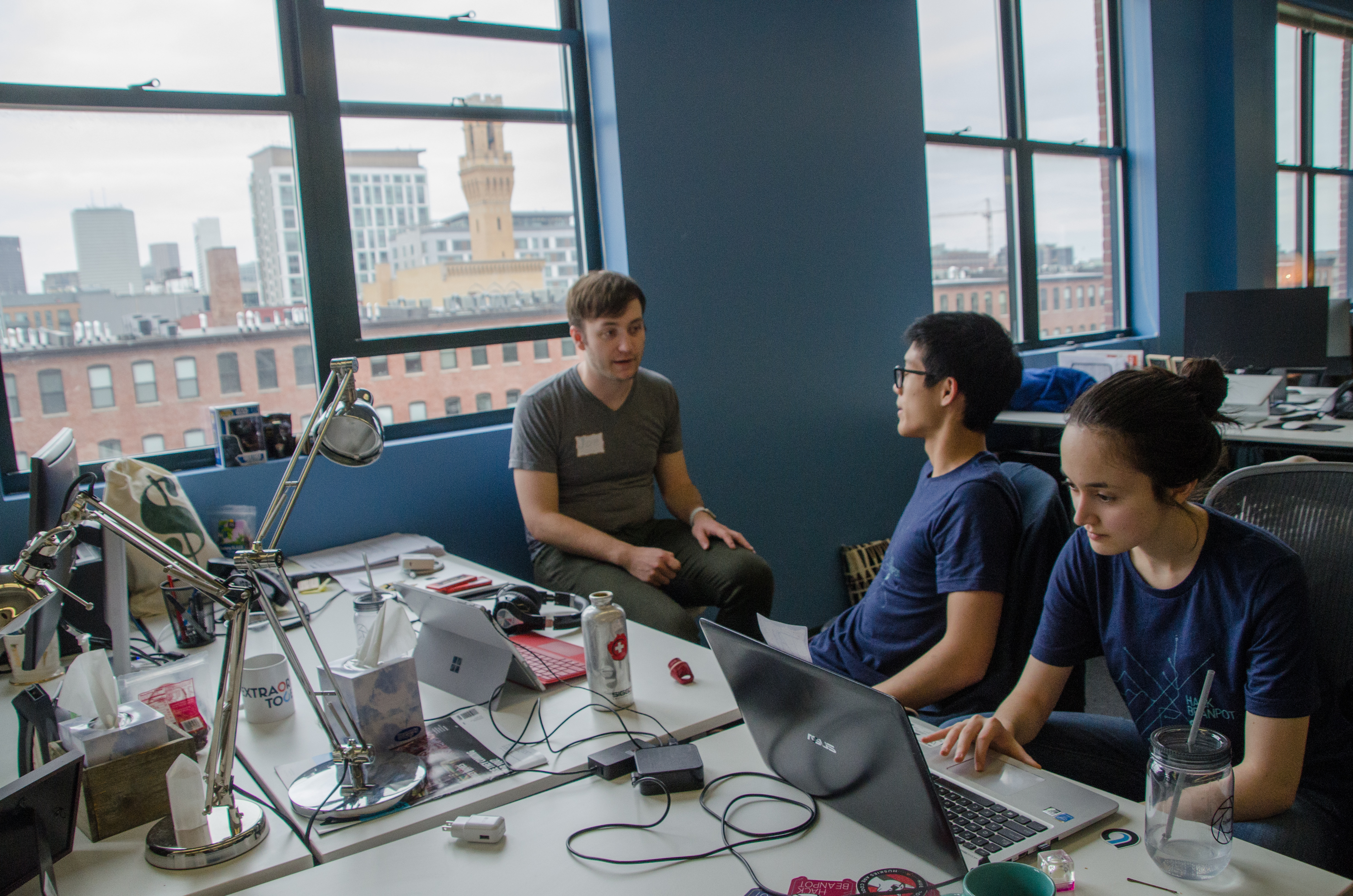
Throughout the course of HackBeanpot’s 40 hours, around 150 students showed up, formed groups and worked on something. In all, 10 prizes were given out, half of them sponsored. Leaving the venue occasionally for sleep and a shower was highly encouraged, but not mandatory.
For some, a hack meant making an app about finding dogs. For others, that meant revamping a robot vacuum cleaner to wander around and construct a Wi-Fi signal-strength map. Or making a cardboard robot on wheels with sensors allowing it to follow its owner around. Or designing an app to wake people up before their stop on public transit. Or using machine learning to identify bands a person might like based on personality expressed in their tweets. Or a better-designed, anonymous way to rate co-ops for other students. Or something else.
“HackBeanpot is really just an opportunity for creative people to build projects outside of their classes,” said Isabel Tripp, a second-year computer science major. “You definitely have to have some initiative to attend [a hackathon] and build something out of the ordinary.”
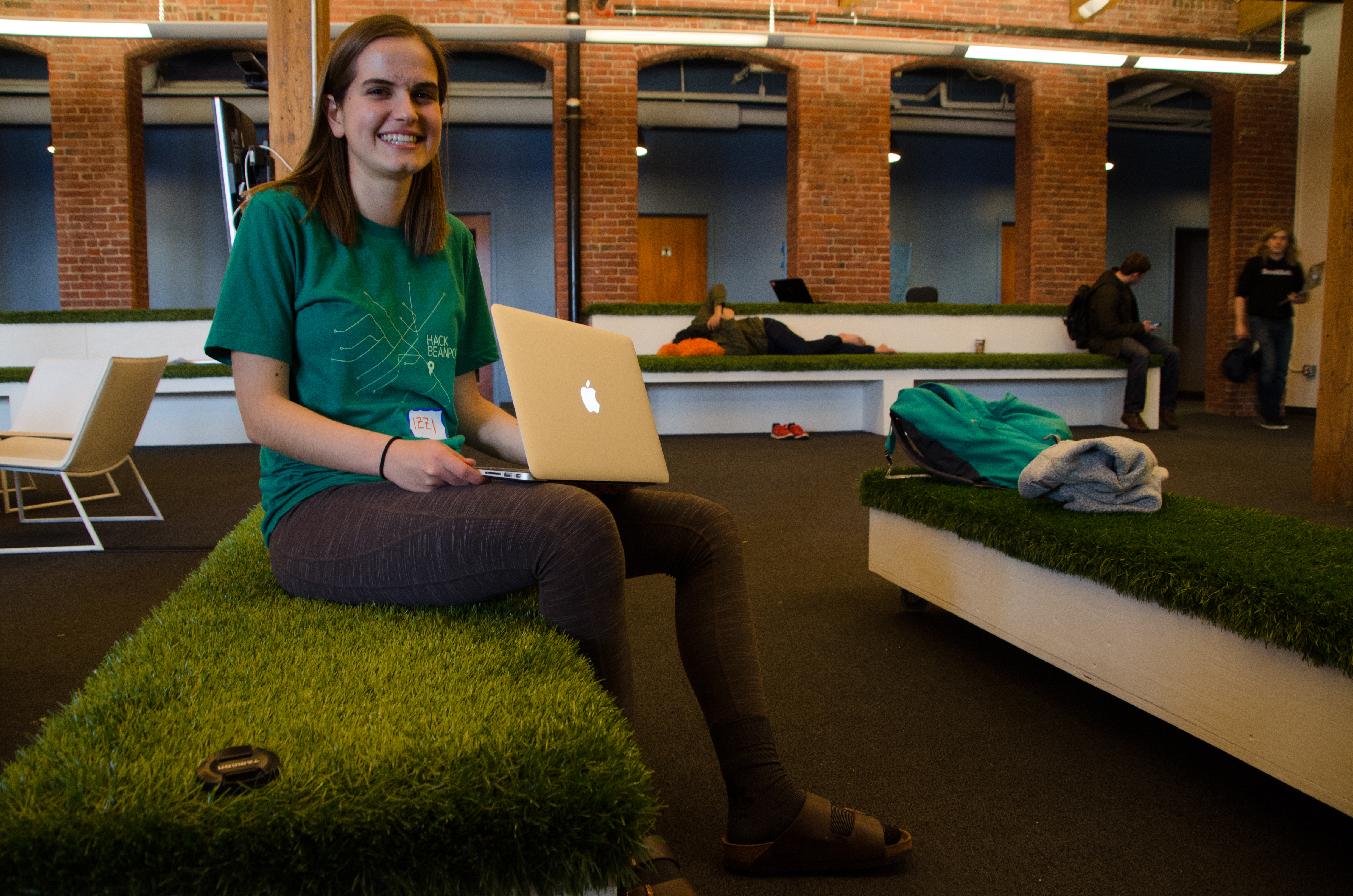
Northeastern students have organzied HackBeanpot annually since 2012, though it hasn’t always been at its current location in a modern office building in the South End. The space usually serves as offices for Genuine and Jack Morton, a marketing and technology company, but was donated for use at the hackathon.
In one corner of the office, virtual reality equipment was available for use and a kitchen area was stocked with a steady supply of meals and snacks. Most of the space was given over to the hackers for the full duration of the hackathon. This year’s event began Friday night, when attendees gathered on the fifth floor of the building for activities including a first-time hacker orientation and presentations by tech professionals.
Last year, when Tripp attended HackBeanpot as a freshman, she said she went in with the mindset that she “wanted to learn something new.” She worked on a coding homework project and got a basic introduction to web development — but she didn’t finish anything to submit for judging.
That’s how it goes for many participants — it’s not always about the successful and sleek projects that do everything bug-free and win prizes. It’s about learning, making mistakes and trying to create. It’s about collaborating and building cool, low-stakes projects, Tripp said.
“We are a fun hackathon. We’re different from the other ones because we specifically target first-time hackers,” said Emily Daniel, the volunteer coordinator and a fifth-year computer engineering major. “We try to be age-diverse, gender-diverse. We reach out to other organizations that aren’t just hacking organizations.”
After last year’s HackBeanpot, Tripp was recruited by event organizers and worked on sponsorship for this year’s event. The organizers call themselves the Core Team and although they are all Northeastern students, the group isn’t affiliated with Northeastern in any official capacity. HackBeanpot is a nonprofit organization run by student volunteers who are mostly computer science majors. They pride themselves on their sense of humor — the group’s contact email is illuminati@hackbeanpot.com –– and have been meeting at least weekly for almost a year to prepare for this event.
During the hackathon, the organizers brought in regular shipments of snacks and meals. They also made announcements, directed volunteers, answered questions and dealt with any problems that arose. The majority of their work, the planning, was long since done.
“The actual event itself is less about our planning and more about what the hackers are bringing,” Tripp said. “As the organizers, we bring tools and we can’t ultimately control what they’re building.”
Daniel said a lot of Northeastern students come because they hear about it from the College of Computer and Information Science peer fellows or just by word-of-mouth. She does not want to run the hackathon solely for Northeastern computer science students; other majors and students from other schools can be involved.
“We try to build a sense of community, feel connected to Boston. We love our Boston roots,” Becker said. “Our audience is creative people, people who use their classroom knowledge and apply it to their interests outside of the classroom.”
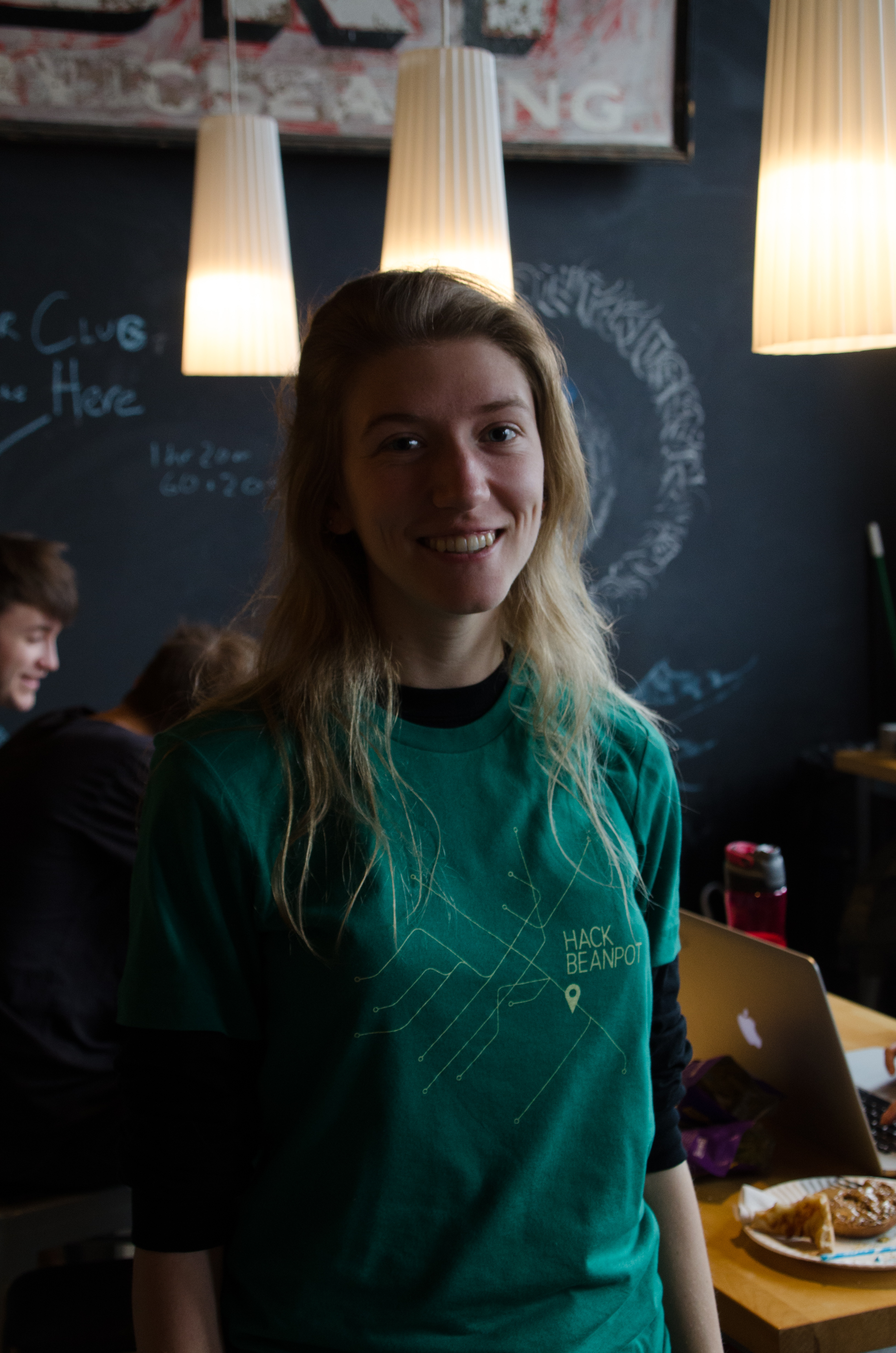
To the sponsoring companies, this event is a way to get their name out to young people and possibly recruit new talent. They share knowledge by sending mentors and speakers, and award prizes to groups that do especially well.
“Some hackathons people are really focused on winning prizes,” Tripp said. “While that is a component of why people want to come here, we also want to demystify the process for people who are intimidated by experienced well-seasoned hackers.”
Durward Benham, a fifth-year senior in computer science, has been to HackBeanpot every year for the last five years. Some of his projects have worked well, some have failed completely, but most had some functionality.
This year, his hack works. He partnered with Amina Ly, a fifth-year environmental science major, to develop Partify. It’s a program that reorders existing playlists on a Spotify profile to be more “danceable.” This is mostly based on tempo and uses Spotify’s application programming interface, more commonly known as API, which is a way for programmers to interact directly with Spotify’s servers.
“This hackathon is really lighthearted. I think that kind of atmosphere encourages people to do what they can and not feel pressured to do something amazing,” said Ly, who is also minoring in computer science and uses coding in her work. “I really like it because it feels like it’s really open and not just restricted to people from computer science.”
In all, 31 projects were submitted for judging by 10 a.m. Sunday and prizes were awarded later in the day. Awards were decided by a panel of industry professionals provided by HackBeanpot sponsors. Eleven of he more fleshed-out hacks had the opportunity to present their work during the closing keynote.
“We don’t focus on winners or losers, we focus on making something cool and recognizing the variety of ways in which people make cool things,” Becker said. “We worked so hard to make this a good event for them.”
